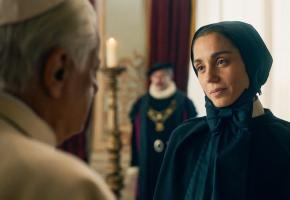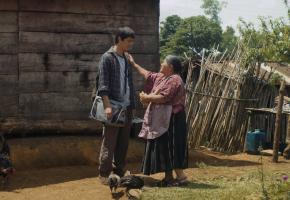It seems fitting to be writing about films and women, on International Women’s Day! Both Gustavo Pizzi and Karine Teles, have focussed a lot of their work on issues and experiences that relate to women. In the case of Gustavo Pizzi, it stems from a specific interest: -
“a curiosity to know more and better understand different aspects of things that I obviously cannot know, being a man.”

Gustavo Pizzi
Gustavo Pizzi, comes from a small city in the hills near Rio de Janeiro called Petrópolis. He started out watching Hollywood films, as that was all he had access to. But everything changed when he went to college to study Journalism, hoping to become a writer. His eyes were opened when he understood that there were other filmic worlds out there, not only Hollywood: -
“I discovered a new world [of Art films] and started to go to the cinema every day, and watch three or four films… A lot of friends of mine were [amused] that I was like a child watching Jean Luc Godard. I had never heard about Godard at that point. I was in love with the idea of learning more about cinema. Of course, I also love Spielberg and Hollywood and the cinema from Hollywood of the 1960s and 70s. But independent films were amazing. Then I discovered another new possibility when I saw a Brazilian film, ‘Vidas Secas’ (1963) Barren Lives…by Nelson Pereira dos Santos (1928-2018).”
Vidas Secas 1963 Nelson Pereira dos Santos- full movie.
The experience of watching this production changed Pizzi’s life. Pereira dos Santos was a huge influence in the development of the Cinema Novo movement in Brazil. Fiercely political, he was motivated by issues like colonialism, political corruption, money laundering and even cannibalism, that had been prevalent among some ancient tribes in the Amazon like ‘How Tasty was my little Frenchman’ (Como era de Gostoso o Meu Francés, 1971).
“I was shocked, bowled over! Now, I could understand how to build an idea and make things happen in cinema. I was always thinking about how to write and create a narrative, but then I had an epiphany, a kind of light and I decided to change my college and dedicate myself to cinema. Since then I have kept on discovering new worlds. I am still studying, still learning … at every moment! Each film, each project is always like a new discovery… a new world that you are going to create and if you think you already know everything, then the new worlds that you create are going to lose something.”

Gustavo Pizzi directs Karine Teles on set
The actress, writer and director Karine Teles and director Gustavo Pizzi were married. They divorced but continued to work together and have proved to be a fascinating creative team. Karine Teles was co-writer on all three productions. Gustavo Pizzi was the director, while Karine played the lead protagonist in all three films.
Karine Teles, also born in Petrópolis, was involved in drama from a very early age, unlike Gustavo. When she was 14 years old, she played in her first professional theatrical production. She has never looked back and has worked non- stop since then. Despite being a veteran, she still went to the university in Rio de Janeiro (Artes Cênicas) to study Drama. Her dream was to work in film. She managed to work in TV, but it was not until 2002, that she appeared in Karim Aïnouz’s film ‘Madame Satã’ (a portrait of João Francisco dos Santos, a convict, chef, black artist and transvestite, gay man, who fathered no less than 7 kids, known as Madame Satã in the area of Lapa in Rio de Janeiro).
Having been born during the Dictatorship, when Teles started work, there was no official support for cinema, so there was no real Film Industry in Brazil. She also began to write and, with her then husband, Gustavo Pizzi, they co-wrote their first feature together: ‘Craft’ (Riscado) 2010, which was very successful.

Karine Teles in 'Riscado' ('Craft') 2010
This film tells the story of Bianca (played by Karine Teles). In order to make a living and pay the bills, Bianca impersonates movie divas and promotes events. She auditions for a big international production and gets the part but the story of her life inspires the director to change his lead character into a version of Bianca. The narrative is based on Karine Teles’ real- life experiences, so they decided to develop a story that questions issues such as talent and hope, and how much fate or luck plays in the mix.
Gustavo: “This film came from a huge desire to talk about work and opportunities, about what one has to do in order to make one’s life, dreams, projects and ideas come true…. how many talents are wasted? How many people live their lives doing something that has nothing to do with their true skills?”
The film did very well and Karine’s performance in this production was highly regarded and she was garlanded with many awards. She was also praised by the critics for her authenticity and honesty. This characteristic has remained with her and all her intelligent performances stand out for having these qualities combined with a natural ability to make the viewer feel she is not acting at all. She has a magnetic physical presence on screen.

Karine Teles in Benzinho
In their second feature, a co-production with Uruguay, ‘Loveling’ (Benzinho) 2015, Karine plays the part of a mother, Irene, who is emotionally torn apart when her elder son, Fernando (Konstantinos Sarris) is offered a handball scholarship in Germany. This is a familiar, intimate and universal tale that explores the emotions of a middle-aged mother, when faced with the first real challenge of a son who is growing up and separating from the family unit. She complicates matters by offering her home to her abused sister and son, creating tensions and amusing situations. With charm, tenderness and wonderful personal idiosyncrasies in the characters, Karine and director Gustavo create a tapestry of emotions in this world. They play with finely observed details, much warmth and humour, to portray a family trying to survive in a house that is disintegrating beneath them, avoiding both melodrama and sentimentalism.
Teles and Pizzi’s third film in the trilogy is, in fact, 4 films, a mini-TV series: “The Last Days of Gilda 2020” (Os Últimos dias de Gilda). ( see review https://www.latinolife.co.uk/articles/last-days-gilda-dir-gustavo-pizzi.) Gustavo Pizzi points out that filmmaking has characteristics all its own, as he aims for a constant fluidity with the scripts for the continuous development of the narrative. He does not believe in rigidity, for this reason. In all the productions that they worked together, with Karine Teles, they agreed that because she was to be the lead character, she should not be involved on the production side: -
“I like to preserve the actors and especially with her, as she was the main actor in my three last films. We would come together on the set when we were rehearsing and shooting and then once we shot the film, she would return when it was ready. With the scripts, I like to have constant movement. If you freeze the idea [as it is in the script], it might not always work that well, so it has to be fluid. When we finish a script, I use it [as a guide] but I keep working on it, as a director, bringing in other collaborators, to build the universe. Even as we are shooting, I always like to think whether we have everything we need for the film, the show, or the series. If we need some extra scenes, maybe I can imagine them, because when we are shooting, that is one of the most important moments, but it’s really fast. ‘The Last Days of Gilda’, for example, was shot in twelve days. But before that, we worked on it for perhaps twelve years! So, you have to be really prepared for those key moments and give your best for the idea.”

Karine Teles as Gilda and João Vitor Silva as Alvinho.
Pizzi also remarks on the importance of having a tight team with cast and crew. It is therefore no coincidence that the same actors pop up in the credits, like Otávio Müller, Lucas Gouvea or Antonio Saboia. He has also tried to have consistency with his crew.
“It is a great point because as I said before, I always believe that each project is [ entirely] new. If you watch my last film ‘Loveling’. It’s completely different in many ways from ’The Last Days of Gilda’ but basically, it’s the same crew as well as the same lead actor. Yet, it’s completely different, because we all understand what is best for the production and that specific idea? I always like to keep that in mind when I work with my collaborators. It’s not only Pedro [Faerstein]. On ‘Craft’ (2010) he was the focus guy, and then he became the DOP on ‘Loveling’ and he also worked with us on ‘Gilda’. It’s amazing, because I always think that the most important work for the photographer is to think about the lighting and the texture. It is really hard to do. I like to do the framing all the time, and think about where the camera will be.

Gustavo Pizzi, with Lucas Gouvêa as Inácio on the set of The Last Days of Gilda
Of course, … always listening to the collaborators, to the cast and trying to understand the situation. The main thing with Pedro, is that I try to liberate him to only think about the lighting and the texture. In this crew, we also have Dina Salem Levy, the Art Director, and Diana Leste, the Costume Designer and they’re really amazing. They worked on ‘Loveling’ and also now, on ‘The last Days of Gilda’.”
Having a familiar team must have also helped the lead actress Karine with her more intimate scenes if which there are many in this group trilogy.
In a very different outing, Karine Teles starred in Anna Muylaert’s 2015 film ‘The Second Mother’ ( A Horas Ela Volta?). She plays Dona Bárbara, a wealthy woman who grants permission to her housekeeper/maid Val (played by the mesmerising Regina Barreto Casé) to have her estranged daughter to stay, expecting it to be only for a few days. The daughter, Jéssica (Camila Márdila), has come to take a university entrance exam and unspoken class barriers immediately rise up, throwing the whole house into disarray. When Dona Bárbara’s son, Fabinho (Michel Joelsas) fails the exam while Jessica passes, Dona Bárbara is jealous, further exacerbating these tensions.
(with English subs)
“It was an amazing experience! It was very hard, because I’m nothing like that character! I come from a very poor family, yeah! My mother was the first generation of her family to go to University, so I had nothing to do with that rich background. It was a big challenge for me to develop that character, and work with (Regina Barreto Casé) who’s a huge star in Brazil. She has been a huge star for a long time and I was a fan, so I really needed a lot of energy!”
Karine Teles insists that her inspiration always comes from ‘life’, so she considers herself to have a political outlook.
“I think that I’m political, because I feel it’s a great opportunity to highlight important issues using such a nice medium as the cinema, you know. It’s a good platform for offering different perspectives and points of view, and in that sense, I try to be political in everything that I write. I think that there’s not a big separation between art and politics, they are pretty much fused together. ‘The Last Days of Gilda’ was inspired by a play for the theatre from 2003 and Rodrigo de Roure Arcola was the author. He gave it to me as a gift. He wrote it for me, and it’s so nice. It was written as a homage to his mother. I think it’s very beautiful, especially if you think that the story was originally written by a young man who was paying a tribute to his mother!

Karine Teles as Gilda
In 2003, when I read the play, I knew it had amazing potential, and Gustavo always wanted to transform it into something for the screen. So, we worked on it to create a feature film, but at that time, we didn’t have the production power, we were nobody… you know! We tried to produce it at the time, but it was impossible, so we did other things until [finally] in 2016, Gustavo had the idea to transform it into a mini-series for TV, which we did. We added a lot of elements to the series. The political things about the election [in the background], were not in the original play, Gilda’s religion was also not in the original. There are also some characters, like Jandira [played by Ana Carbatti) that were only a line in the play, [literally]: “I like Jandira, she’s an independent woman.” We developed the character. She is Gilda’s neighbour and best friend. We gave her a relationship with Gilda, and with Wallace (Antonio Saboia)… so there was a lot of adaptation going on.”
A great admirer of Fellini, in particular ‘8 ½’, Karine Teles also adores Francis McDormand-Teles’s favourite film at the moment is 'Nomadland', for its beautiful take on freedom. Meanwhile, Teles’ life is buzzing, she wrote and directed a short film that is being presented at festivals. She has also written a feature film that she will be directing, which is at the financing stage. At the same time, she has just completed a TV series for Amazon which will be opening, internationally around June or July, called ‘September Mornings’.
Gustavo Pizzi continues to work on his own material: - “I think that I will keep trying to understand, and bring some ideas and perspectives for the –[enlightenment] of society, the main thing that I am looking for is to find new stories, good stories , maybe bringing together Hollywood and Art films, that I began to learn about when I was about 20 years old, and things from my childhood. Finding a way to bring those two universes together and maybe create something new with that.”
‘The Last Days if Gilda’ 2020 (Os Últimos dias de Gilda) Directed by Gustavo Pizzi and co-written by Gustavo Pizzi and Karine Teles. / ‘Loveling’ 2015 (Benzinho) Directed by Gustavo Pizzi and co-written by Gustavo Pizzi and Karine Teles / ‘Craft’ 2010 (Riscado) Directed by Gustavo Pizzi and co-written by Gustavo Pizzi and Karine Teles.



















